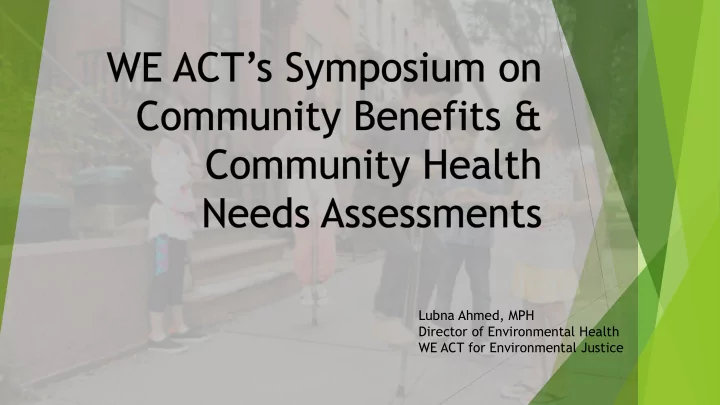

Lubna Ahmed, MPH Director of Environmental Health WE ACT for Environmental Justice
IRS and Community Benefits In 1969, the Internal Revenue Service (IRS) introduced a new tax-exemption standard, requiring hospitals to provide “community benefits,” which included the following requirements: “Operate a 24 -hour emergency room Provide charity care to the extent of the hospitals’ financial ability Extend medical staff privileges to all qualified physicians in the area, consistent with the size and nature of the facility Accept payment from Medicare and Medicaid programs on a nondiscriminatory basis Maintain a community-controlled board (i.e., a governing board with membership, by appointment, primarily from the local community)”. 1
Affordable Care ACT (ACA): New Requirements Since the passage of the ACA, hospitals must now conduct a Community Health Needs Assessment (CHNA) at least once every three years Hospitals must also file community benefits information by means of Schedule H (Form 990) Established tax penalties for hospitals that do not comply, as well as reporting requirements regarding national compliance on the IRS. *The IRS has provided initial guidance concerning the CHNA requirement, which has been further augmented by individual states to accommodate their state-specific requirements for tax-exempt status. 2
Hospital Community Benefit Program A resource created specifically for state and local policymakers who seek to ensure that tax-exempt hospital community benefit activities are responsive to pressing community health needs. The program provides tools to state and local health departments, hospital regulators, legislators, hospitals, and revenue collection and budgeting agencies These stakeholders then develop approaches that prioritize the unique health needs of their communities and work toward a more accessible, coordinated, and effective community health system. 3
Community Health Needs Assessments (CHNAs) CHNAs, conducted every 3 years, have several requirements: Demographic Assessment identifying the community A community health needs assessment survey of perceived health care issues Quantitative analysis of actual health care issues Appraisal of current efforts to address the health care issues Formulate a 3-year plan - the community comes together to address remaining issues collectively, ultimately working towards growing a healthier community 4
WE ACT and Community Benefits WE ACT is committed to improve the methods and practices that local hospitals, use to engage communities in effectively conducting community needs assessments and providing community benefits as is required by the Internal Revenue Service (IRS) and reinforced under the Patient Protection and Affordable Care ACT of 2010 (ACA). WE ACT Envisions a community that has: informed and engaged residents who participate fully in decision-making on key issues that impact their health and community. strong and equal environmental protections. increased environmental health through community-based participatory research and evidence-based campaigns.
Sources: 1. “The Affordable Care Act: A Brief Summary.” The National Conference of State Legislatures , www.ncsl.org/portals/1/documents/health/hraca.pdf. 2. “Community Benefit / Community Health Needs Assessment.” Health Services Research Information Central , www.nlm.nih.gov/hsrinfo/community_benefit.html. 3. “Hospital Community Benefits.” National Center for Healthy Housing , nchh.org/tools-and-data/financing-and-funding/healthcare- financing/hospital-community-benefits/. 4. Crossley, Mary. “Health and Taxes: Hospitals, Community Health and the IRS.” Yale Journal of Health Policy, Law, and Ethics , vol. 16, no. 1.
Recommend
More recommend